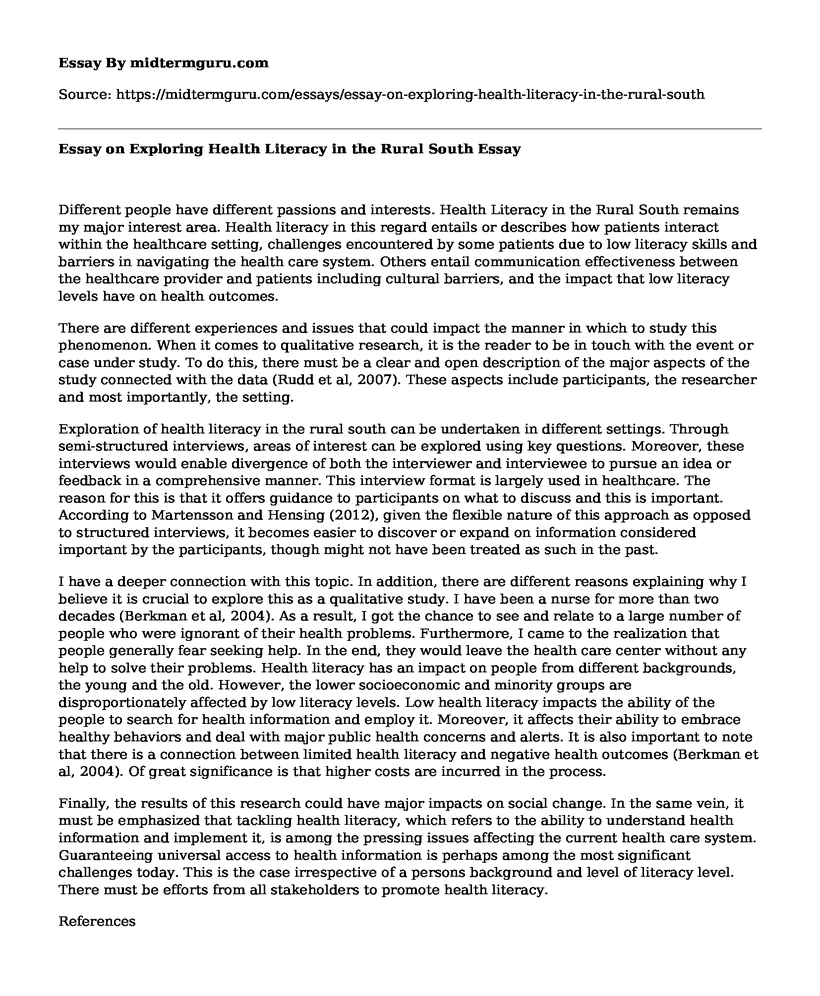Different people have different passions and interests. Health Literacy in the Rural South remains my major interest area. Health literacy in this regard entails or describes how patients interact within the healthcare setting, challenges encountered by some patients due to low literacy skills and barriers in navigating the health care system. Others entail communication effectiveness between the healthcare provider and patients including cultural barriers, and the impact that low literacy levels have on health outcomes.
There are different experiences and issues that could impact the manner in which to study this phenomenon. When it comes to qualitative research, it is the reader to be in touch with the event or case under study. To do this, there must be a clear and open description of the major aspects of the study connected with the data (Rudd et al, 2007). These aspects include participants, the researcher and most importantly, the setting.
Exploration of health literacy in the rural south can be undertaken in different settings. Through semi-structured interviews, areas of interest can be explored using key questions. Moreover, these interviews would enable divergence of both the interviewer and interviewee to pursue an idea or feedback in a comprehensive manner. This interview format is largely used in healthcare. The reason for this is that it offers guidance to participants on what to discuss and this is important. According to Martensson and Hensing (2012), given the flexible nature of this approach as opposed to structured interviews, it becomes easier to discover or expand on information considered important by the participants, though might not have been treated as such in the past.
I have a deeper connection with this topic. In addition, there are different reasons explaining why I believe it is crucial to explore this as a qualitative study. I have been a nurse for more than two decades (Berkman et al, 2004). As a result, I got the chance to see and relate to a large number of people who were ignorant of their health problems. Furthermore, I came to the realization that people generally fear seeking help. In the end, they would leave the health care center without any help to solve their problems. Health literacy has an impact on people from different backgrounds, the young and the old. However, the lower socioeconomic and minority groups are disproportionately affected by low literacy levels. Low health literacy impacts the ability of the people to search for health information and employ it. Moreover, it affects their ability to embrace healthy behaviors and deal with major public health concerns and alerts. It is also important to note that there is a connection between limited health literacy and negative health outcomes (Berkman et al, 2004). Of great significance is that higher costs are incurred in the process.
Finally, the results of this research could have major impacts on social change. In the same vein, it must be emphasized that tackling health literacy, which refers to the ability to understand health information and implement it, is among the pressing issues affecting the current health care system. Guaranteeing universal access to health information is perhaps among the most significant challenges today. This is the case irrespective of a persons background and level of literacy level. There must be efforts from all stakeholders to promote health literacy.
References
Berkman, N. D., DeWalt, D. A., Pignone, M. P., Sheridan, S. L., Lohr, K. N., Lux, L., et al.
(2004). Literacy and health outcomes (AHRQ Publication No. 04-E007-2). Rockville, MD: Agency for Healthcare Research and Quality.
Martensson, L., & Hensing, G. (2012). Health literacy a heterogeneous phenomenon: a
literature review. Scandinavian Journal of Caring Sciences, 26: 151160. doi: 10.1111/j.1471-6712.2011.00900.x
Rudd, R. E., Anderson, J. E., Oppenheimer, S., & Nath, C. (2007). Health literacy: An update of public health and medical literature. In J. P. Comings, B. Garner, & C. Smith. (Eds.), Review of adult learning and literacy (vol. 7) (pp 175204). Mahwah, NJ: Lawrence Erlbaum Associates.
Cite this page
Essay on Exploring Health Literacy in the Rural South. (2021, Jun 07). Retrieved from https://midtermguru.com/essays/essay-on-exploring-health-literacy-in-the-rural-south
If you are the original author of this essay and no longer wish to have it published on the midtermguru.com website, please click below to request its removal:
- Personal Safety at Good Shepherd Hospice - Essay Sample
- Roles of a Community Health Worker - Paper Example
- Paper Example on Technology-Mediated Diabetes Prevention Interventions
- What Are the Consequences of Obesity? - Essay Sample
- Paper Example on Preventing Healthcare Associated Diseases
- Essay Sample on Conspiracy Theories: Do Vaccines Cause Autism?
- Cancer Research: Unveiling Genetic Signatures to Treat Aggressive Tumors - Essay Sample







